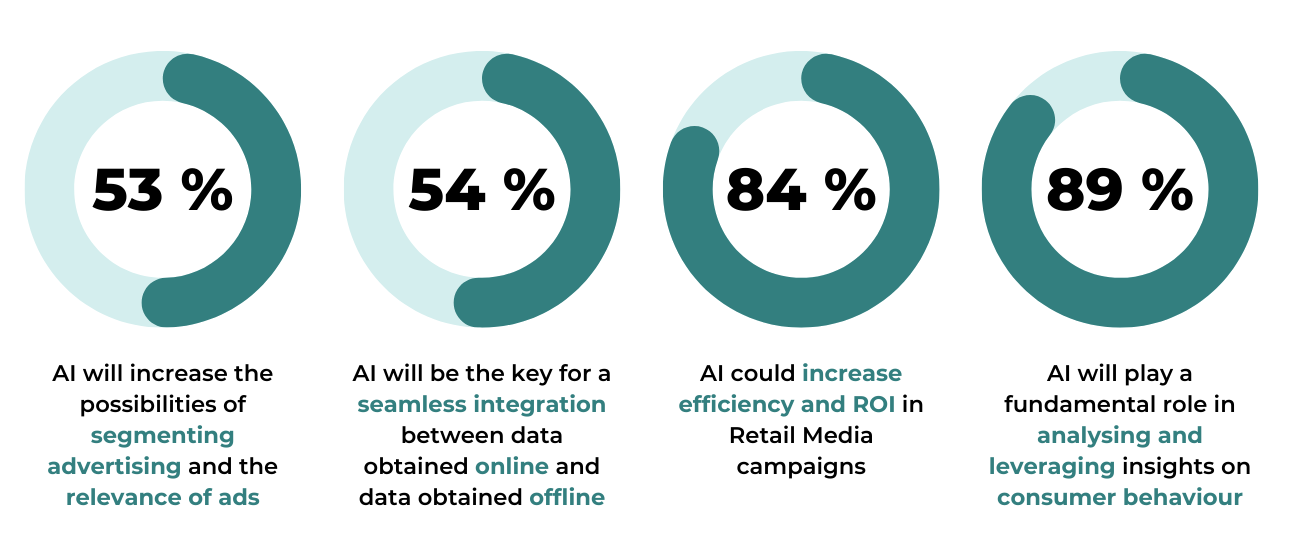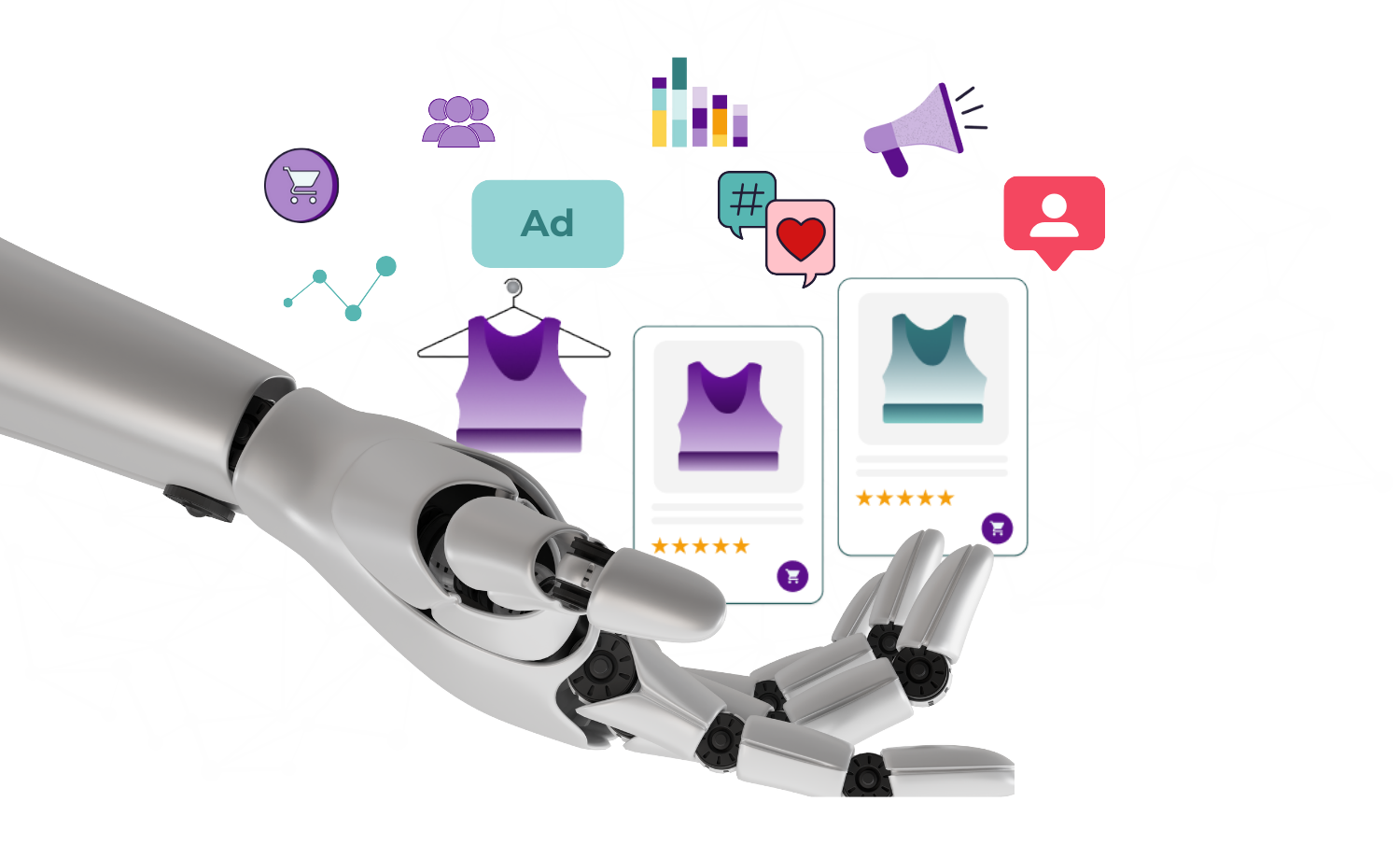The Revolutionary Impact of Artificial Intelligence on Retail Media
What is the role of Artificial Intelligence in Retail Media?
Artificial Intelligence (AI) is rapidly transforming the Retail industry, and specifically Retail Media, redefining how brands interact with consumers and optimise their advertising campaigns. AI allows businesses to analyse large volumes of data, automate processes and personalise experiences. This results in greater efficiency and effectiveness in marketing strategies. In this context, Retail Media —which includes advertising on e-commerce platforms or mobile apps from retailers— is benefiting significantly from the capabilities of Artificial Intelligence, allowing retailers and brands to deliver more relevant and personalised messages to consumers.
4 key facts about the impact of AI on Retail Media, as seen by FMCG advertisers
Cooler Screens is a technology company that develops specialised software to create and manage digital experiences in physical stores. It facilitates retailers and brands the opportunity to interact with consumers at key moments of the Customer Journey, using smart screens that adapt dynamically to consumer behaviour and context. This is based on data collected at critical decision points within the physical store, especially relevant in the FMCG sector.
This company, committed to the revolution that AI will bring to its business, conducted a survey in which it asked 200 FMCG advertisers about their perception of AI, how it can impact their investments in Retail Media and the role it will play in RMNs (both online and in-store).
Key survey results
The respondents’ answers help us understand the attitude and thoughts of these advertisers regarding the impact of Artificial Intelligence on Retail Media:

- 53% of respondents believe that AI will significantly increase the possibilities of segmenting advertising and the relevance of ads that each consumer sees through Retail Media Networks.
- 54% of those who responded see Artificial Intelligence as key for a seamless integration between data obtained online and that which is obtained in the offline environment.
- When asked if they believe that AI could increase efficiency and ROI in Retail Media campaigns, a very high percentage of respondents (84%) anticipated a positive effect.
- Another key finding of the survey was the role of Artificial Intelligence in analysing in-store purchase behaviour: 89% of respondents said that AI will play a fundamental role in analysing and then leveraging insights obtained on consumer behaviour in physical stores.
During the Innovation Summit 2024, in a talk given by Cooler Screens on how “Bringing stores to life: AI + Retail”, Shanthi Rajagopalan, Global Director of Strategy, Retail and Consumer Goods at Microsoft, stated: “The physical store remains the heart of Retail today, but it has always been rich in services and poor in data”. With this comment, Shanthi underlined that AI will be crucial for analysing in-store behaviour, integrating online and offline data, and increasing ROI.
Benefits of starting to use AI in Retail Media
Task automation
Task automation is one of the most obvious benefits of Artificial Intelligence in Retail Media. AI algorithms can handle repetitive tasks such as managing advertising inventory, adjusting prices in real time and scheduling ads. Automating processes will allow your teams to focus on strategy rather than manual planning and activation tasks.
This not only reduces the time and costs associated with these tasks, but also minimises the risk of human error. For example, a robust machine learning model that uses data from performance of previous campaigns can generate a media plan that determines an optimised strategy to achieve the goals of the current campaign. AI systems will also be able to automatically adjust advertising bids to maximise ROI, adapting quickly to changes in demand or competition.
Creative optimisation
AI is also revolutionising the creation of creative content for advertising campaigns. Artificial Intelligence-based tools can generate multiple versions of ads, optimising their elements for different audience segments or for A/B testing.
This capability not only saves creative teams time. It also enables mass personalisation, tailoring ads to the preferences and behaviours of consumers. This results in greater relevance and effectiveness of advertising campaigns.
In addition, AI can also be used to ensure content quality, ensuring the correct placement of creative elements such as logos or brands.
Obtaining real-time insights
AI’s ability to process and analyse large volumes of data in real time is invaluable for Retail Media. Machine learning algorithms can identify emerging patterns and trends, providing actionable insights that can be used to adjust advertising campaigns on the fly.
If a campaign is not performing as expected, Artificial Intelligence can suggest adjustments to targeting or content to improve results.
Another future benefit of obtaining real-time insights will be the ability to cross information from your campaign performance along with data obtained from the Digital Shelf. Imagine being able to cross-referencing your performance information with your own appearances on the digital shelves, competitor data or organic product behaviour data. This possibility would give your advertising campaigns a much richer context.
Improving your Retail Media strategies
AI allows for continuous improvement of Retail Media strategies by providing detailed analysis and data-driven recommendations. Retailers can use Artificial Intelligence to evaluate the performance of their campaigns across multiple channels and optimise their strategies holistically. This includes everything from identifying the most profitable products to promote to choosing the most effective advertising channels.
Machine learning, along with AI, can also help to identify trends in each season, or the specific moments of greatest purchase volume (such as Black Friday), and offer recommendations on the best ways to connect with consumers on a buyer journey that includes this seasonality.
Ultimately, all these improvements translate into more efficient use of advertising budget and a higher return on investment.

5 ways AI is transforming Retail Media
1. Ad segmentation and personalisation
Artificial Intelligence allows for extremely precise audience segmentation, making it easier to create highly personalised advertising campaigns. Using behavioural, demographic and purchase data, algorithms can segment audiences much more effectively than traditional methods. One of the uses of generative AI for hyper-personalisation would be to adjust advertising campaigns based on contextual information such as location. For example, the same beer ad could be adjusted from one city to another to show fans of the local football team.
This would improve the relevance of ads for consumers. It would also increase the conversion rate and customer loyalty. Brands using AI and machine learning to personalise their ads have seen a 1.3 times increase in incremental return on advertising investment, according to data from 84.51º.
2. Combining in-store and online data
The integration of data from multiple sources, both online and offline, is another area where Artificial Intelligence is having a significant impact. Retail Media advertising in stores has enormous potential, as we mentioned at the beginning of this article. But it is more difficult for advertisers to measure the success of omnichannel or in-store exclusive campaigns compared to measuring the results of an online campaign.
As AI systems evolve, they will be able to combine and make sense of data from online and in-store purchases. This will provide a more complete picture of consumer behaviour. This will allow retailers to offer consistent omnichannel experiences, where ads and promotions are relevant to both online shoppers and those who visit physical stores. Furthermore, it will also make it possible to close the loop and boost investment in Retail Media advertising in stores.
3. Incorporating stock data into ads
AI’s ability to manage and analyse inventory data in real time allows retailers to incorporate this information into their advertising. This is particularly useful for product promotions and flash sale campaigns, where stock availability can change rapidly.
Artificial Intelligence systems can automatically update ads to reflect current availability. In this way, customer frustration is avoided and the shopping experience is improved.
4. Interpreting the data provided by Retail Media
Retail Media generates a huge amount of data, from ad impressions to interaction metrics and conversions. Brands working with multiple RMNs have the added challenge of making sense of all the metrics they obtain from the different platforms. Artificial Intelligence is essential for processing and analysing this data, transforming it into actionable insights .
Machine learning algorithms can identify which data to focus on. They can also detect which ads are performing best, which audience segments are responding most positively and what adjustments can be made to optimise results. This allows retailers and brands to have a broader picture, make informed decisions and continuously improve their Retail Media strategies.
5. Performing analysis by crossing Retail Media performance data with Digital Shelf Analytics data
One of the future trends that are going unnoticed and that only market leaders currently use is the cross-referencing of internal campaign performance information obtained thanks to Retail Media Networks with data harvested from the Digital Shelves.
Feeding algorithms and models with not only click, impression or sales information but also with what is actually happening in your categories and search results is very powerful.
As we mentioned at the beginning, imagine contextualising your business’s internal data with the specific positions your ads occupied at that time. Or with the promotional dynamics that existed in the category, both your own and your competitors’, the specific positions of each product on the digital shelf or the Share of Shelf of each brand.
These metrics could have even more impact on the results (sales, ROI) of Retail Media campaigns than investment or ad claims themselves.
However, interlinking all this data on a large scale to achieve that new dimension of optimisation and analysis was very costly or impossible until now. Currently, thanks to technological advances, we can achieve this with Artificial Intelligence, using the inferential capabilities of Large Language Models.
How do we approach this at flipflow?
At flipflow, we firmly believe in the power of cross-referencing your business’s internal data with real-time market data. This allows your company to reach conclusions much more efficiently and quickly. Retail Media analysis is no exception to this belief.
We have cases of travel companions from sectors like FMCG who monitor their sales channels with us, obtaining all the Retail Media data from both their own and their competitors.
With this information, on the one hand they audit the appearances and the competitive context within their active RMNs. On the other hand, they automatically integrate, within our platform, the data they obtain from their campaign managers such as Criteo, Walmart Connect or Amazon Ads.
This allows them to generate very advanced reports and optimise their advertising investment and sales, obtaining a lot of value in an aggregated way. It is also applicable in the reverse direction, being able to see how their activity in Retail Media impacts their organic Share of Shelf, global sellout and other data that was previously impossible to review.
Have you ever thought that with all this information, there could be an Artificial Intelligence that could analyse all this data in seconds every day and give you very valuable insights, having the entire context of the market and your company “in its head”?
You won’t have to dream for much longer, perhaps this will happen in 2024 with the help of flipflow.

Artificial Intelligence to revolutionise the future of Retail Media
Artificial Intelligence is redefining the Retail Media landscape, offering new opportunities to improve efficiency, creativity and personalisation in advertising campaigns. By leveraging AI, retailers and brands can not only optimise their operations, but also offer more relevant and satisfying shopping experiences for consumers.
With the continuous evolution of technology, the potential of AI in Retail Media is only just beginning to be explored, promising even more revolutionary transformations in the future.



